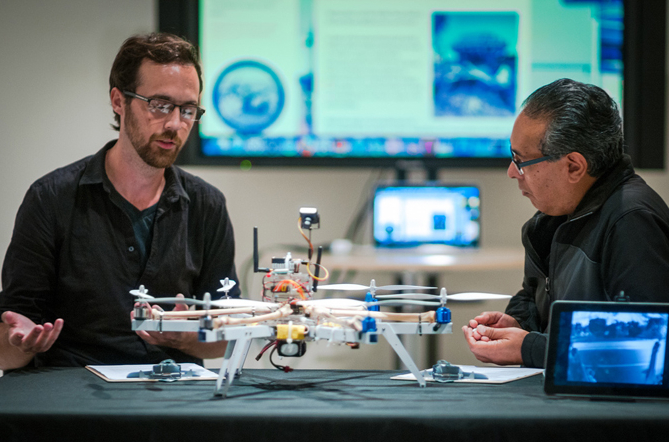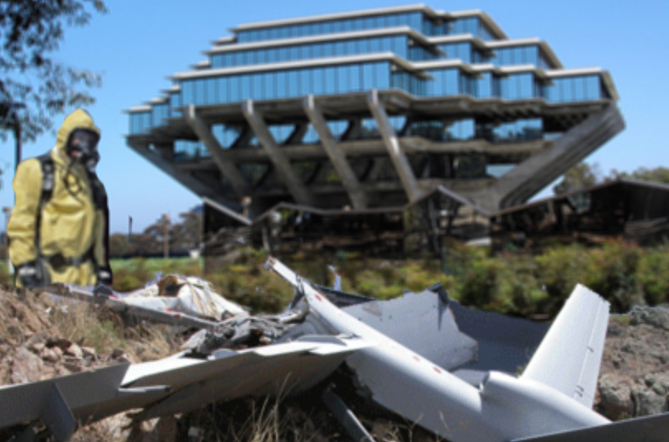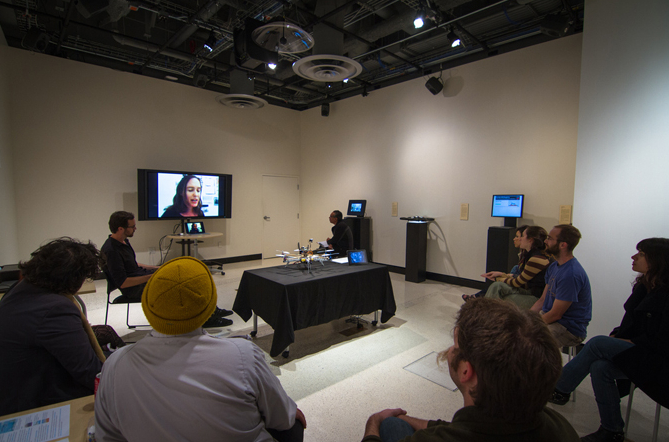Drone Crash Incident
Ricardo Dominguez + Ian Alan Paul + Jane Stevens
Statement
In December of 2012, the artists Ricardo Dominguez, Ian Alan Paul and Jane Stevens performed as researchers and consultants for the fictional UC Center for Drone Policy and Ethics and simulated a “Drone Crash Incident” on the UC San Diego campus. The drone crash, as a form of critical fiction or disturbance theater, was enacted over the course of one week through the distribution of press releases, documents, photographs, and other forms of ‘evidence’ which were subsequently published in various media in and around San Diego. The simulation culminated in a public town hall to discuss the simulated drone crash with students, faculty and various members of the public. The stated mission of the UC Center for Drone Policy and Ethics was articulated in press materials as:
“The UC Center for Drone Policy and Ethics (UCDPE) is a new research institution founded by the UC Office of the President (UCOP) to explore the emerging implications of drone research, use and production within the UC system. Bringing together a group of interdisciplinary scholars and researchers from across the UC campuses, the center is involved in several collaborative research projects involving students, faculty and policymakers at the cutting edge of Unmanned Aerial Systems studies.”
Before the town hall, University of California officials disavowed the occurrence of any drone crash and denied the existence of the UC Center for Drone Policy and Ethics. At the town hall event, Ricardo Dominguez and Ian Alan Paul presented records of the crash and discussed various theoretical and political concepts related to drones, as well as discussed the research and production of military drones in San Diego and on UCSD’s campus. Jane Stevens then gave a presentation on the history of drone crashes, which was followed by a wider discussion among those who attended.
Biography
Ricardo Dominguez is a co-founder of The Electronic Disturbance Theater (EDT), a group who developed virtual sit-in technologies in solidarity with the Zapatistas communities in Chiapas, Mexico, in 1998. His recent Electronic Disturbance Theater 2.0/b.a.n.g. lab project ( http://bang.transreal.org/) with Brett Stalbaum, Micha Cardenas, Amy Sara Carroll, and Elle Mehrmand, the Transborder Immigrant Tool (a GPS cell phone safety net tool for crossing the Mexico/US border) was the winner of “Transnational Communities Award” (2008), an award funded by Cultural Contact, Endowment for Culture Mexico–US and handed out by the US Embassy in Mexico. Ian Alan Paul is a transdisciplinary artist/theorist living between San Francisco, Barcelona, and Cairo who is most known for his writing and projects that engage in contemporary debates concerning politics, aesthetics, technology, and ethics. He works in a diversity of media, including but not limited to digital video, photography, websites/databases/networks, and projection. His work has been featured in The Atlantic, Al Jazeera, Le Monde, Art Threat, Jadaliyya, Art Info, and C Magazine, and has been exhibited in galleries in Asia, North America, the Middle East and Europe. He received his MFA and MA at the San Francisco Art Institute in 2011 and is a PhD candidate in UC Santa Cruz’s Film and Digital Media program. He is currently part of the faculty at AUC in Cairo.
Project Website
http://www.ianalanpaul.com/drone-crash-incident-2012/
Creative Websites
www.ianalanpaul.com and http://bang.transreal.org/
Previous Press Coverage
Huffington Post – “Drone Crashes On UC San Diego Campus, Revealed As ‘New Media Art Project’”
The Blaze – “Alarming Drone Crash on College Campus Turns Out to be an Elaborate Hoax”
NBC San Diego – “Source of Mystery Drone Crash Revealed”
Boing Boing – “Drone crash on college campus in San Diego is art-hoax”



